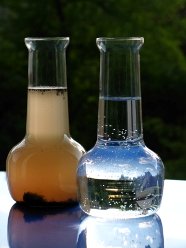Bottled Water Facts
A Summary of Key Points
Nancy Hearn, CNC
Note: As an Amazon Associate I earn from qualifying purchases.
I have selected the following bottled water facts that have been meaningful to me. If you come across other facts about bottled water that are relevant, please share them below.
Bottled Water Fact #1: Safety
- In general, bottled water is considered safe to drink in the U.S.
- Some bottled water is not tested for radioactive, chemical or biological contaminants.
- There are no federal filtration or disinfection requirements for bottled water. The task is assigned to the states, most of which have inadequate programs.
- Bottled water companies are not required to have their water tested by government-certified labs, whereas tap water is.
- Bottled water plants are only required to test for coliform bacteria once a week. Tap water must be tested 100 times a month.
- Bottled water sold across state lines is regulated by the FDA, which has much lower requirements for water regulation than the EPA’s guidelines for tap water.
Bottled Water Fact #2: Health Disadvantages
- Evidence is conclusive that all bottled water contains at least some level of contaminants. Long-term consumption of even small amounts of certain contaminants can weaken the immune system and compromise health.
- Nearly 40 percent of all bottled water is re-processed tap water. With your municipal tap water, you can at least get an annual water quality report to know what contaminants you may be drinking. With bottled water, you never know what you’re getting.
- Most of the bottled water that is actually treated is usually filtered by reverse osmosis or distillation. Both methods remove not only contaminants but also the naturally occurring minerals in water. Drinking de-mineralized water for any length of time is simply not healthy.
- Plastic bottles leach synthetic chemicals (such as pthalates) into the drinking water. The longer the water sits in bottles—in the bottled water plants, throughout the distribution process, and on store shelves—the more likely the chemicals will leach into the water.
- Exposure to heat will increase leaching of chemicals, especially when bottled water is taken outdoors, left in cars on warm days, etc.
Bottled Water Fact #3: Cost to the Consumer
- Bottled water purchased in stores ranges between $1.00 and $4.00 per gallon. Compare this to tap water, which costs about $0.003 per gallon.
- Bottled water that is delivered to homes costs on average $1.50 per gallon.
- These bottled water facts should be enough to convince all consumers to say NO to bottled water, especially since most bottled water is just expensive tap water.
Bottled Water Facts #4: Consumer Benefits
- Marketing experts know that the biggest commodity in the U.S. is convenience. Bottled water is convenient, especially for folks on the go. (Many consumers have found a refillable water bottle or even a filtering water bottle just as convenient.)
- Some consumers think bottled water tastes better than tap water. (Many home water filters can remove the chlorine and other contaminants that give tap water the bad taste.)
Bottled Water Cost #5: Environmental Cost
- Even though some people recycle water bottles, over 86 percent are thrown away.
- Over 1.5 billion tons of plastic water bottles end up in U.S. landfills each year. It takes over 300 years for plastic to degrade.
- Bottled water wastes fossil fuels and water in the production and transportation processes.
- In the U.S. over 47 million gallons of oil are used to produce plastic water bottles.
Reference
BusinessInsider.com: 15 Outrageous Facts About the Bottled Water Industry; 2011.
Return from Bottled Water Facts to Bottled Drinking Water
If you would like to reproduce or republish this article or any other article on this site, feel free to do so but please include a reference or link to the article at WaterBenefitsHealth.com.
Sign Up for Our Monthly
Newsletter
Visitor Comments
"This was the best and most straight forward info on the net yet. I asked a question and got an answer that made sense. Thank you so much!" - Linderlinder
FINALLY!!! I have been wondering about this for years with no 'solid' answer. This is exactly what I've been wanting to know! Thank you for this share..." by Andy
"Thank you for the information, Nancy. I appreciate it. Your article and findings are very helpful, referring to dehydration." - Carolyn
"Lemon water is one drink both my wife and I can't drink. It upsets our stomachs. We are in our sixties and in very good health—well, better health now that we drink about 2 liters plus of water each day. It has made so much difference to our digestive systems and recovery every day. Thank you for your website and effort." - Rod



